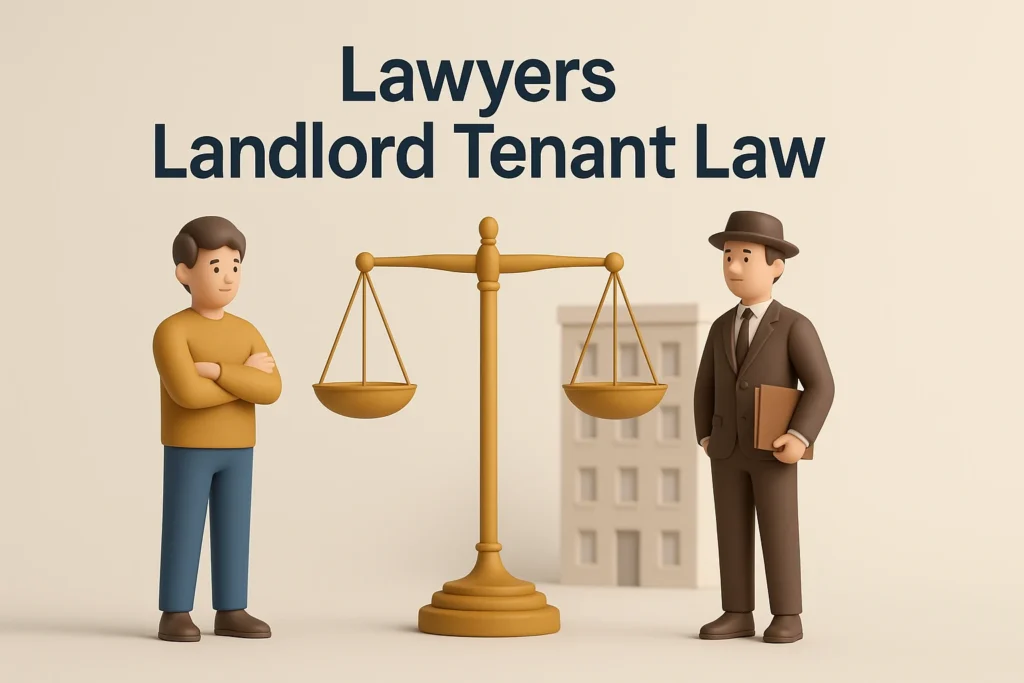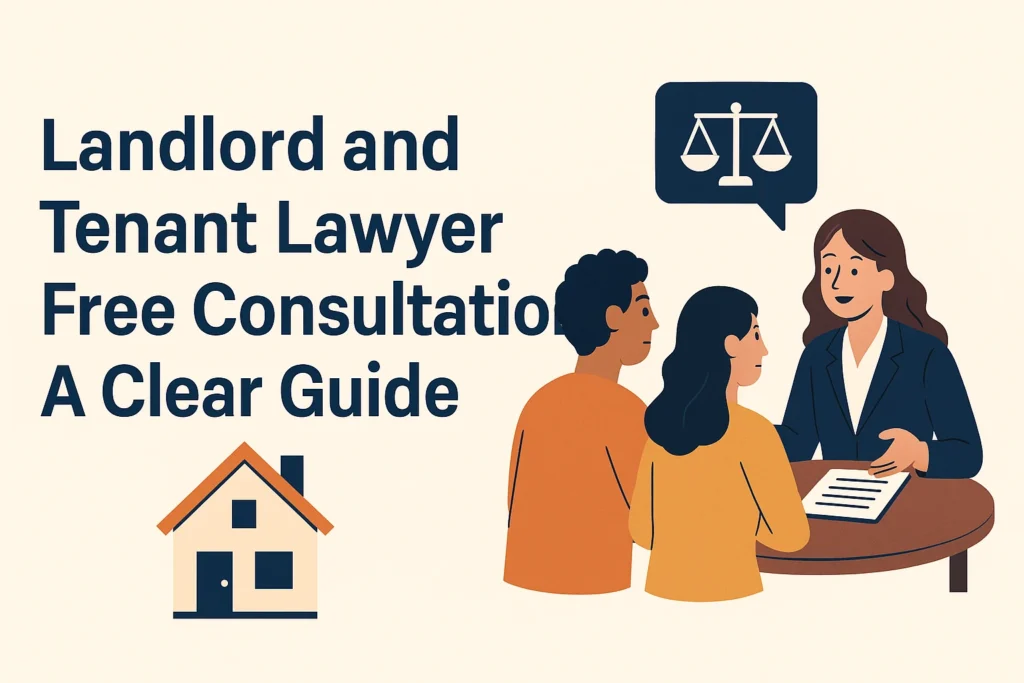Renting a place can seem easy at first. You pay rent. You follow the lease. The landlord keeps the place safe and in order.
But real life does not always go that way. Leaks happen. Rent increases without warning. Eviction notices show up without reason. Both sides feel pressure.
Landlord-tenant lawyers fix that tension. These lawyers understand rental law. They know how to protect tenants.
They know how to support landlords. If your rental turns into a legal problem, this type of lawyer can guide you.
You do not need to face rental trouble alone. A lawyer stands between you and chaos. That means less stress and better results in court or before it gets there.
What Is Landlord-Tenant Law?
Landlord-tenant law covers the rules between property owners and renters. These laws explain what each side can and cannot do.
Every state has its own rules. Some cities add more laws to protect renters.
The lease forms the base of this legal deal. That paper explains rent terms, repair duties, and how each side must act.
But even the best lease cannot stop every issue. Arguments happen. Accidents happen. One side may break the agreement.
Tenants have rights. They deserve safe homes. They deserve fair notice before removal. They should not face harassment.
Landlords also have rights. They can ask for rent. They can take back their property if tenants break the lease. The law balances both sides.
Judges rely on this law to settle housing fights. If either side takes a case to court, the outcome depends on facts and how the law is interpreted.
A good lawyer knows both and uses that knowledge to win or settle smart.
What Does a Landlord-Tenant Lawyer Do?
This lawyer focuses only on housing issues. They do not handle car accidents or family law. They only deal with rental law. That focus gives them deep knowledge.
Tenants hire these lawyers to stop evictions, fix unsafe housing, or recover stolen deposits. Sometimes landlords act without cause.
They send notices too fast or skip repairs. Tenants may feel lost. A lawyer can change that.
Landlords also use these lawyers. Some renters stop paying rent. Some damage walls or floors. Others will not leave after the lease ends.
A lawyer helps landlords deal with that. They send the right notices. They file court papers. They attend hearings and defend the owner’s rights.
Landlord-tenant lawyers also review lease papers. They make sure the terms meet state laws. That helps avoid trouble later. A good lease saves both time and money.
If you already face legal pressure, a lawyer handles the case. They explain your options. They protect you in court. Their job is not to scare the other side. Their job is to keep your side safe.
Why Tenants May Need a Lawyer
Not every landlord plays fair. Some ignore problems. Some raise rent without warning. Others break the law and hope the tenant does nothing. A tenant has power, but only if they use it.
A tenant lawyer stops illegal evictions. Many renters get three-day notices and feel they must leave. That may not be true. A lawyer can stop the process or buy more time.
Lawyers also help when homes become unsafe. Mold, no heat, or bad plumbing can make a place hard to live in.
Some states allow tenants to fix the problem and take the cost out of rent. But you must follow the law. A lawyer shows you how.
If your landlord keeps your deposit without cause, the law may let you sue. A tenant lawyer files that case.
They also help stop threats or harassment. Some landlords yell, threaten, or enter without notice. That breaks the law.
Legal help brings calm. You understand your rights. You stop guessing. You make smart moves.
Why Landlords May Need a Lawyer
Renters do not always follow the rules. Some break things. Some stop paying rent. Others bring in pets or people not listed on the lease. Landlords want peace, not drama. A lawyer can protect them.
Landlords must follow a legal process to remove tenants. They cannot just change locks or throw out belongings.
That breaks the law. Judges may punish them if they skip steps. A lawyer knows the steps and follows them.
Lawyers also help write leases. That means clear rent terms, rules on pets, and proper notice rules. A smart lease stops fights before they start.
If a renter sues the landlord, the lawyer defends them. A case may deal with mold, discrimination, or deposit problems. A good lawyer protects the owner’s name and money.
Even small landlords need legal help sometimes. Owning one rental unit still comes with risk. A lawyer reduces that risk. That means fewer court visits and fewer legal bills later.
When Should You Call a Lawyer?
Some wait too long. They try to fix problems alone. That leads to worse outcomes. You should call a lawyer as soon as the problem starts. That early call can save you from mistakes.
Tenants should call when:
- They get an eviction notice that seems wrong
- The landlord ignores key repairs
- The home feels unsafe
- Rent rises without legal notice
- The deposit disappears after move-out
- They feel threatened or unsafe
Landlords should call when:
- Renters stop paying
- Tenants break the lease
- Someone damages the property
- Eviction steps feel unclear
- Renters refuse to leave after notice
- A tenant files a lawsuit
Some lawyers offer low-cost consults. Others charge hourly or flat fees. Early legal help costs less than a full lawsuit later. Think of it as protection, not expense.
Common Legal Issues in Rentals
Rental problems follow clear patterns. Most lawyers see the same few issues again and again. Here are the most common:
Evictions: A landlord wants the tenant gone. The law requires steps. The lawyer helps start or fight that process.
Security deposit fights: The renter moves out. The landlord keeps part or all of the money. A lawyer checks the facts and takes the case to court if needed.
Unsafe homes: The place has mold, leaks, or pests. A lawyer helps the renter take legal steps to force repairs.
Lease rule breaks: A tenant brings in extra people or breaks noise rules. The landlord wants action. A lawyer sends notices or files in court.
Discrimination: Some renters face unfair treatment based on race, religion, gender, or family status. That breaks federal and state law. A lawyer can stop it.
These problems feel big to those involved. A lawyer makes them smaller. They turn stress into solutions.
How to Find the Right Lawyer
Good help is not far. Start with your state’s bar association. They list trusted lawyers by topic. You can call or search online.
Look at sites like Avvo or Justia. These show reviews, costs, and background. Pick someone local. That person will know your city’s rules and judges.
If money is tight, call Legal Aid. Many cities have programs that help tenants for free. Some also help small landlords. Ask your local court clerk where to find free or low-cost legal support.
Ask questions:
- Have you handled my kind of case?
- What will it cost?
- How fast can we begin?
- Do you work more with tenants or landlords?
Choose someone who gives clear answers. Avoid lawyers who sound unsure. You want someone who speaks like they know the path ahead.
Common FAQs
What do lawyers handle in landlord-tenant law?
They help with rent issues, evictions, lease terms, repairs, and tenant rights.
Who can hire lawyers for tenant law?
Tenants and landlords both use them to handle legal problems.
When should I contact a lawyer for landlord-tenant law?
Contact one as soon as you get a notice or face housing trouble.
Do I need a lawyer for eviction?
If you feel the eviction is unfair or sudden, a lawyer can help defend you.
Can a landlord evict without cause?
Not in most cases. States require notice and legal steps.
Conclusion
Renting or leasing property brings many rules. When those rules break down, you need more than hope. You need legal help. A landlord-tenant lawyer stands on your side.
They read the fine print. They know the deadlines. They speak in court with calm and skill. Tenants gain peace. Landlords gain order. That balance keeps the system fair.
Do not guess. Do not wait. When your home or income feels at risk, talk to a lawyer. That step turns fear into focus. Legal help is not a last resort. It is a smart first move.
Trending Post: Tenant Lawyer NJ Free Consultation: Know Your Rights and Legal Options
Disclaimer: This article is for general information only. It does not give legal advice. Please speak to a licensed attorney in your state for help.



